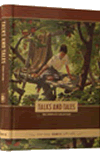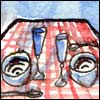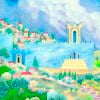i.
In the history of our people of some 800 years ago, we find a name that may well have been written in giant type a foot high-Rabbi Judah Halevi.
Little is known of his life and personal history, for he left no actual record of his life. He was born in Toledo about 4840 (1080) . His father, Samuel, recognized his son's genius when the boy was still young, and provided him with all the necessities of life, so that the boy might study and write, untroubled by any financial burdens. Here in Toledo he spent his days in intense study of the Talmud and in various secular fields, such as Arabic poetry, which was very complicated, Hebrew grammar, philology, philosophy and medicine.
Judah Halevi lived in very chaotic times. In Spain, there was a constant struggle for power between the Church and the Moors. Seeking peace and quiet, Judah set out for Andalusia (a province in Spain which the Christians had not yet conquered). Here, Judah studied with the great Rabbi Isaac Alfasi and continued to write poetry. Although still very young, Judah attracted much attention from great scholars and poets. Here, too, he began a lasting friendship with the poet Moses ibn Ezra who greatly admired the young man's genius.
From city to city Judah wandered, making the acquaintance of great men wherever he went, winning their admiration and writing odes in their honor. Finally, he settled in Cordova. But he did not earn his livelihood through writing poetry. He practiced medicine and thus he was able to support himself.
ii.
All through Rabbi Judah Halevi's poetry one feels the strong current of his great love for the Land of Israel. Witnessing the suffering of his fellow Jews, his heart was heavy with sorrow and grief. If only the Jews would return to G‑d and win His favor that He might return them to their homeland to dwell therein in peace and tranquility! Many of his most beautiful- poems are expressions of his great love, and longing for the Holy Land. As the years went by, his desire to go to the Land of Israel grew, and finally Rabbi Judah decided to undertake the long journey which was difficult and full of peril. Although many of his friends tried to dissuade him, it was of no avail.
Once again, Judah took his rod and set off on his travels, but this time the goal was his beloved Zion. Once again, he won the friendship and admiration of everyone he met. Everywhere he was welcomed by great scholars and distinguished statesmen. But each moment he spent gaining new strength for his journey, made him impatient and eager to proceed on his way. Finally he arrived in Cairo. Only one more step and he would be in the land of his dreams. All his life he had waited for this moment. There, where the spirit of G‑d rested, he would spend the rest of his days, studying His law, praising His name. Though he enjoyed his stay in Egypt, he could scarcely await the moment of his departure.
iii.
The Holy Land at last! There it lay before his own eyes. The gates of Jerusalem rose before him... Legend has it that seeing the desolation of his beloved land, Rabbi Judah Halevi was overcome with emotion and love. He rent his robes, and walking barefoot, sang his Ode to Zion. An Arab horseman, jealous of Rabbi Judah's love, which he knew he could never emulate, rode him down. And so, Rabbi Judah died, on the beloved soil of the land of our Patriarchs and Prophets, singing her praises with his last breath.
Rabbi Judah Halevi's poetry is timeless-still as beautiful and fresh today as it was hundreds of years ago when it was written. Although he wrote of many things, his love for G‑d, the Torah and the Land of Israel far outweighed his other interests. His true piety was evident in everything he wrote. Many of his poems, written for the holidays and fasts, were included in the Mahzorim. His Odes to Zion, or Zionide, a series of moving dirges bewailing the fate of Zion, each one beginning with the word "Zion," form the concluding dirges of the "Kinoth" which we say on Tisha b'Av.
Rabbi Judah is famed not only for being the greatest poet of the Middle Ages but as an outstanding philosopher as well. His great work, Al Khazari, originally written in Arabic and later translated into Hebrew, is a masterpiece of Jewish philosophy. In his praise of Judaism, Rabbi Judah shows his deep-thinking mind and his great intellect.
Throughout the ages, Rabbi Judah has lived through his poetry and other work. And he will continue to be immortal - a spring that will never dry for all those who come to drink at his fount seeking spiritual beauty and Godly wisdom.







Join the Discussion